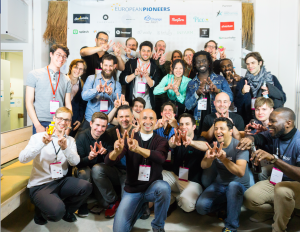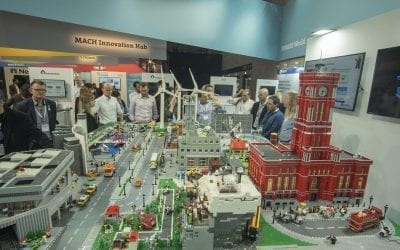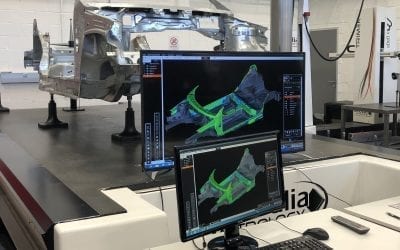"After years of corporate business practice, EuropeanPioneers was a culmination of fresh ideas and insights – it was a pleasure to be part of it!" commented Peter Muryshkin, Enterprise Business Analyst and Change Manager, whilst speaking about the accelerator final DemoDay.
A few weeks ago, on April 14th, 250 investors, mentors, entrepreneurs and editors came together to attend the event held in Berlin, celebrating the second round of EuropeanPioneers. Over the past 2 years, part of the FIWARE Accelerator Programme and backed by 6,000,000€ provided by the European Commission, EuropeanPioneers have supported 25 start-ups from all over Europe, aiming to build bridges between a team to be investor ready when the Programme is finished. Each team received 175,000€ in funding in order to accelerate them further and, at the event, the second half of the start-ups –13 of them, from five different countries–, presented themselves and their most significant outcomes, achieved after only 8 months of acceleration.
After all the hard work, intense mentoring, extensive product testing and individual training sessions, start-ups in various verticals such as AgriTech Food, Energy, Smart City, IoT and Media & Content offered their innovative solutions. “We choose very diverse startups on purpose. Although they are active in different markets, they face the same challenges: they all have to validate their products, they have to reach out to customers” said Laura Kohler, Director of EuropeanPioneers, when speaking about the cross-sector focus of the accelerator.
Here are some of the most interesting projects stemmed from such funding, coaching, networking and use of innovative technologies:
-
Infarm project is not only a fascinating one but it proposes a promising future of success if their team continue to make the accurate choices. It encompasses a vision of a future in which cities can become self-sufficient in their food production, where autonomous farms grow fresh premium produce at affordable prices, eliminating waste and environmental impact. They center themselves on Vertical farming where the farms are a perfect synergy between hardware and software, creating greater production efficiency than any other technology in the market. With cost effective, cloud connected, modular advantages, Infarm aims to eliminate the need for importing food (especially vegetables), and hereby reducing carbon footprint.
Since 50% of food is wasted in transportation before arriving at the destination, one of the major problems for our future would be: “How are we going to feed 9 billion people by 2050?”. Infarm might have the right answer for that question.
-
SPLASH is a virtual reality app that allows you to take and share 360-degree images and videos which can be viewed on smartphones and some headsets. This idea is a new step towards virtual reality and has consequently had a huge impact on social networks as well as being named by its accelerator as the SME with the most promising business opportunities.
-
Watly provides a solution to the 3 major needs of modern civilization – access to clean water, electricity and connectivity. The device is a water purifier, sanitizing water without filters, from any source of contamination. It is also a power station which can recharge external devices, working on solar energy; a hybrid design that has never been produced before. It generates free electricity and is a hub of telecommunication devices connected to the internet. Through sensors and digital recognition, data is collected and sent to the cloud and although it is a stand-alone machine, when connected in a network it will benefit millions of people.
- Lingua.ly is currently in the middle of the first pilot stage, where they have developed a solution for language training (focusing especially on refugees at the moment). It has had a huge social impact as they have entirely democratized teaching as any native speaker is able to become a teacher as soon as they acquire the technology. It is a fantastic solution if you want to train people one-on-one without using too many resources, and there is a scalable outcome because the project is working with university students, not language teachers.
Such a variety of projects has had a social impact as a positive and shared focus, as well as a highly disruptive and shareable approach. Scott de Mercado, founder of audiotube provides us with a final statement that illustrates how the encouraging spirit has passed on to the developers and entrepreneurs around the accelerator: "EuropeanPioneers has been an incredible experience for us. The enthusiasm, the support and the love the EuropeanPioneers team has shown all the startups have been very endearing”
Now watch the following video summarizing EuropeanPioneers' DemoDay in Berlin.




